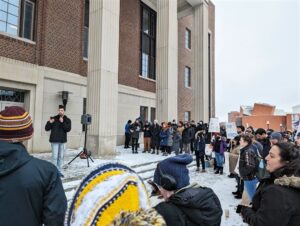
The five new Minneapolis school board members are (clockwise from upper left) Sonya Emerick; Collin Beachy; Lori Norvell; Fathia Feerayarre; and Abdul Abdi.
(Photo/Jaida Grey Eagle and Drew Arrieta, Sahan Journal)
BY DEBRA KEEFER RAMAGE
We published each of 2022’s Education supplements on a sort of a cliffhanger. In early March we were in the pre-strike cooling-off period for a historic strike that took place the next week. In October, it was a month until an election that would bring five new members to the Minneapolis school board, there was a superintendent search underway and a lawsuit challenging the new contract in progress. The five months between October 2022 and now have been action-packed.
Election: To recap the election, we had five candidates on an “MFT Slate” that had all been DFL-endorsed. In the month before the election, one of these, KerryJo Felder, experienced some negative press and social media woes, while an acceptable challenger, Sonya Emerick, emerged against her. Long story short, the other four won but Felder lost by a narrow margin. The new school board members as of November are Emerick (at-large, who has a long and deep organizing background and is trans, autistic, and the parent of a special ed student); Collin Beachy (at-large, ex-teacher); Lori Norvell (ex-teacher, District 5); Abdul Abdi and Fathia Feerayarre (both uncontested, Districts 1 and 3, respectively).

Rochelle Cox, interim superintendent for Minneapolis Schools until 2024
Superintendent search: The Minneapolis school board was forced to extend the search for a permanent superintendent by one year. Now its goal is to hire someone by July 1, 2024. Interim Superintendent Rochelle Cox will remain in the position as the district continues its search.
In late 2022, the school board hired Plymouth-based EPU Consultants to do community engagement prior to starting the candidate search, for a contract fee of $70,000. But at a school board meeting in February, many board members, including some who had voted with the majority to hire the firm, expressed dismay at what they saw as inadequate levels of engagement so far. Reading the few news items on this, the superintendent search seems to be in a dire state of confusion and disagreement.
The Anoka-Hennepin school district started a superintendent search about

Cory McIntyre, who will assume the post of superintendent of Anoka-Hennepin Schools in July
the same time as MPS, but they concluded the search in December by hiring Cory McIntyre, a former assistant superintendent, and superintendent of Osseo Schools since 2019. (Anoka-Hennepin is actually the largest school district in Minnesota, with MPS coming in second.) McIntyre will start in July in his new role.
Lawsuit: In January of this year, a judge dismissed the extremely ill-conceived lawsuit against the Minneapolis School System for “misspending” taxpayer money by not laying off teachers of color. In an online article on Jan. 11, KARE 11 reported: “Judge Christian Sande ruled that the plaintiff, Deborah Clapp, lacked legal standing to make the claim. Clapp is a taxpayer within the Minneapolis Public School district but not a teacher laid off under the new policy. Judge Sande dismissed the case without prejudice, meaning someone with legal standing could still challenge the policy in court.”
The thing is, there is a serious teacher and educational support professional shortage all across the region, which is particularly acute in the MPS, so it’s possible there will be no significant layoffs within the life of this contract, and since a majority white labor force of educators demanded this clause, how likely is it they would sue if it should occur that it came into force? I think conservatives shot themselves in the foot on this.
Impending fiscal cliff: The fiscal cliff was looming before the pandemic, which was a kind of kicking the can down the road event, revenue-wise. Coincidentally, other time-specific funding programs are coming to an end around the same time as COVID relief money is closing down. The loss of enrollment is a constant drip eroding the sustainability of free public education. As recently as December, MPS Senior Financial Officer Ibrahima Diop was quoted as saying that drastic changes needed to be made, or the system would “run out of money” in the 2024-25 school year. Closing schools is a normal response to the loss of both funds and students, and that has been done in the recent past. In addition, this year the system has put three of their empty school buildings up for sale.
The state’s surplus: Before the elections that resulted in a trifecta (controlling the executive branch and both houses of the legislature) for the DFL party, Minnesota had a $12 billion budget surplus. But the 2022 legislature failed to reach agreement on how to spend it, so it carried over. Now we have a $17.5 billion surplus, a majority DFL legislature, and a DFL governor who used to be a teacher and talks up education and “investing in our kids.”

Karen students and teachers at St. Paul Public Schools
(Photo/Ellen Perrault, Saint Paul Public Schools)
Even before the trifecta, the Walz administration had devised and broadcasted a very ambitious plan to transform and rescue public education. It’s called the Due North Education Plan and you can read about it here: education.mn.gov/MDE/about/plan. We live in hope! But also, call your legislators and do other traditional activist things.
Some other things you can do to help save public schools (however you envision that looking) and get better leadership in districts include basic local political engagement. Even though there are no Minneapolis school board elections in 2023, there are very consequential City Council elections. There are elections in 2023 for the St. Paul school board (three seats) and the Anoka-Hennepin school board (four seats). Getting involved now will help you know how to navigate party politics when the 2024 elections come around. State legislators, up for election then, actually control the purse strings for public education.
Dilemmas for St. Paul (SPPS): You may have heard about the fatal stabbing by a classmate of 15-year-old Devin Scott at Harding High School. It followed rising violence in St. Paul schools, and it’s causing some to call for the return of SROs (School Resource Officers, meaning armed police in schools during class times).

The Karen diaspora in Minnesota keeps their language alive.
These were abolished in 2020 (guess why?) so only high school seniors remember them, and their opinions are divided. Some claim they did feel protected while others say they never felt safe and don’t want them back.
Karen taught in St. Paul this fall: The Karen people are an oppressed ethnic group mostly from Burma. According to the Karen Organization of Minnesota, there are more than 20,000 Karen-speaking refugees in Minnesota, the largest such community in the U.S. Although spread across the state, the majority live in Ramsey County.
The SPPS made history recently by introducing instruction in the Karen language. This minority but very living language has been banned in Myanmar (Burma) for over 40 years, ever since the Burmese military coup. Over half of the 4,700 Minnesota students from Karen-speaking households attend SPPS. Read more about this in the Sahan Journal article at sahanjournal.com/education/karen-language-classes-st-paul-public-schools- refugees-minnesota.

University of Minnesota graduate student workers’ unionization rally
Higher education: Graduate student workers at the University of Minnesota recently formally announced a campaign to form a union. If it’s successful, about 4,000 U of M graduate student workers would form the UMN Graduate Labor Union (UMN-GLU), affiliated with United Electrical, Radio and Machine Workers of America (UE). See this piece by my friend Ian to learn more: twincitiesdsa.org/2023/02/umn-grad-workers-announce-union.






















